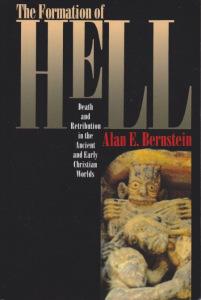 Some books are complex enough to require a slow reading.Alan E. Bernstein’s The Formation of Hell: Death and Retribution in the Ancient and Early Christian Worlds is such a book.For those of us raised in a faith primarily geared toward avoiding Hell, the concept becomes a lifelong nightmare.It doesn’t help that, depending on your clergy you’re taught different, sure-fire ways of achieving that avoidance.Often it hinges on “believing” the “right” thing.Fundamentalists tend not to call it “doctrine” since that sounds rather Catholic, but the idea’s the same; it’s a tenet of faith.As Bernstein shows, however, Hell is an idea that developed over a very long time with several different views of what happens after death.There’s no single, linear progression, but rather a conglomeration of ideas from a variety of sources.
Some books are complex enough to require a slow reading.Alan E. Bernstein’s The Formation of Hell: Death and Retribution in the Ancient and Early Christian Worlds is such a book.For those of us raised in a faith primarily geared toward avoiding Hell, the concept becomes a lifelong nightmare.It doesn’t help that, depending on your clergy you’re taught different, sure-fire ways of achieving that avoidance.Often it hinges on “believing” the “right” thing.Fundamentalists tend not to call it “doctrine” since that sounds rather Catholic, but the idea’s the same; it’s a tenet of faith.As Bernstein shows, however, Hell is an idea that developed over a very long time with several different views of what happens after death.There’s no single, linear progression, but rather a conglomeration of ideas from a variety of sources.
No single volume can cover all the background to Hell.Bernstein focuses on Egypt for the early material, as well as Babylonia.These early civilizations demonstrate that people have always wondered what comes next, and what happens to those who oppress others—the bullies of this life who don’t deserve the same eternal rest as the rest.Usually some form of punishment awaits, but not always.In the Hebrew Bible one of the great issues was the fact that everyone goes to Sheol, good and bad alike.As in classical Greece and Rome (on which Bernstein spends a great number of pages) the concept of the netherworld is gloomy, but not torture.Except in exceptional cases, of course.The Greeks had Tartarus as a place for those who dissed the divine.
Even early Christianity didn’t have a uniform view of it.The New Testament is decidedly divided on the topic.Revelation seems to be the last word, but it’s not.Later thinkers such as Origen and Augustine (who came to different conclusions) weighed in.Catholic Christianity lavished great love on the latter and Augustinian views became disproportionately influential.Reading his lack of compassion can cause nightmares, although he justifies it theologically.The one thing I missed in Bernstein’s lengthy treatment was the Zoroastrians.This religion of ancient Persia introduced a distinct dualism into the biblical world; it perhaps represents the first relatively developed concepts of Hell and Heaven.Zoroastrianism suffers from lack of documentation, however, and it is difficult to parse it as meticulously as Bernstein does the other cultures covered.This book requires much pondering as it’s read, and if you were raised believing this kind of thing it’s sure to bring back a nightmare or two.
